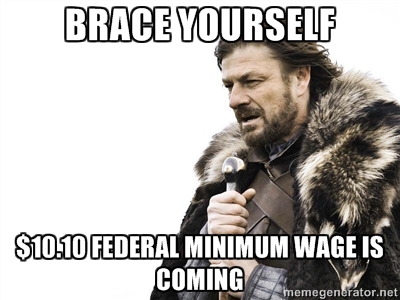Here we go again, right now minimum wage is the big debate taking place on the national stage in the United States. Fast-food workers are going on strike with union support, mainstream news publishing op-eds on why the minimum wage should be raised, Reddit politics threads, and the State of the Union address on part of the Obama administration advocating a raise in the federal minimum wage to $9 or $10 per hour.
I won’t spout that raising the minimum wage will cause unemployment; there is little significant evidence suggesting that. The reason for this is that most of the jobs, around 60%, that make up the minimum wage like retail or fast-food services do not necessarily fear employment reductions because there is little alternative competition.
Paul Krugman wrote in an op-ed today, “Americans won’t drive to China to pick up their burgers and fries.” And while that is true, he does not take into account the illegal immigrants who take jobs that pay less than the minimum wage. His argument grossly overestimates how many individuals earn minimum wage and how this sole factor alone will be groundbreaking for combating inequality.
In the United States wage earners that make exactly the minimum account for only 2% of the hourly workforce, according to the U.S. Bureau of Labor Statistics. Even more workers make less than the minimum wage, illegal immigrants, who will suffer when the cost of living goes up when their wages likely will not.
This outcome might impact future hiring prospects for young people with little experience. The Bureau reported that that 16 to 21 year olds make up the highest age demographic earning minimum wage. Workers under the age of 25, represent only one-fifth of the hourly paid workers (who make up 60% of the entire workforce), and they make up half of those paid the federal minimum wage or less.
Businesses will be forced to cut costs elsewhere or raise prices on their goods. When prices are raised, purchasing power is adjusted to accommodate the workforce now earning more than the minimum wage. The American Economic Journal found that “a 10 percent increase in the minimum [wage] is associated with less than half a percent increase in the overall price level.” As expected, states with the highest minimum wages also have the highest costs of living.
An unintended consequence of raising the minimum wage is that it eventually keeps the new workers (the old minimum wage earners) with the same purchasing power. This also has the added effect of lowering the purchasing power of those other workers who earned more than the minimum wage before the adjustment!
Some have argued that these people losing purchasing power anyway because the country with a growing economy is always subject to inflation, so minimum wage is necessary to keep up with inflation. This is a myth. Generally, when a country experiences natural monetary inflation as a response to economic growth, wages rise to correlate the new economic circumstances. If the government arbitrarily determines the price of some laborers, then wages do not unanimously rise equally as they normally would. This is one of the reasons why we are not seeing an increase in wages in the United States, because inflation is so low.
To be fair though, there is disagreement among economists regarding the minimum wage. Personally, I am pretty much indifferent to it. It will not make people less poor in the long run. The policy implementation in itself will not even impact that many people in the workforce. Nevertheless, the evidence provided indicates that an increase in the minimum wage will not reduce or impact poverty in the long term. The Huffington Post blogger-types claiming that it makes all the difference in the world at combating inequality are kidding themselves.
Nazzy S. is a page editor for The Libertarian and writer for The Midnight Zone. Find her on Twitter.


[…] This article was originally published in The Libertarian. […]